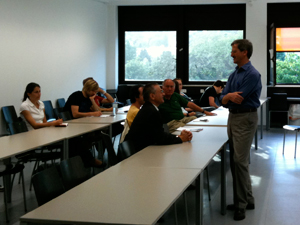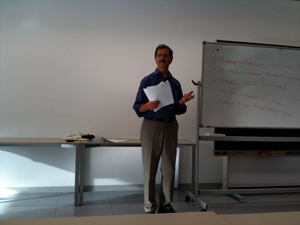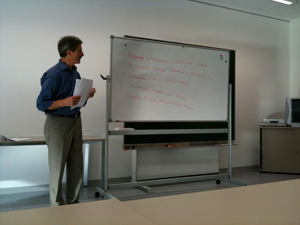American Corner Innsbruck
Lecture by Prof. Max Haller
Auf dem Weg zu den Vereinigten Staaten von Europa?
Soziologische Überlegungen zu Gesellschaft und Verfassung der EU
June 9, 2010, 7.00 p.m., SR 50105/ Seminarraum 2 (Bruno-Sander-Haus, 1st floor)



The thematic range of the ACI’s lecture series was enriched by Prof. Max Haller (Karl-Franzens-Universität Graz) and his presentation on the sociological aspects of the European Union’s relationship between its constitution and its societies. As already suggested in the title, Professor Haller compared the USA and EU on a variety of levels in his talk and covered numerous issues ranging from questions concerning the accuracy of terms such as “European society” to a discussion of the EU as a community based on the rule of law and a final consideration of the reasons and consequences of the Greek economic malaise.
Introducing the audience to basic sociological considerations, Prof. Haller drew on the theoretical foundations of Montesquieu and explained that the sum of all norms and laws of a collective should not be viewed as a random conglomeration, but as expressive of the respective society’s spirit, which in turn depends on the composition of the collective. Thus, the higher the heterogeneity of a society (e.g. in ethnic or religious terms), the higher its potential for conflict and the more this diversity must be taken into account in the creation of that society’s constitution. Haller added that one also has to consider whether such a constitution is a consequence of coercion (i.e. if it was imposed on the respective society), or whether the collective entered into this specific contract of its own accord. Of course, as far as the European Union is concerned, the intense exchange in economic, cultural, scientific, and also legal sectors (to which the numerous treaties testify) makes it clear that the Union belongs to the latter category. However, Prof. Haller also mentioned that the EU is characterized by a significant degree of differentiation due to highly consolidated individual social structures and units of varying size. Moreover, another issue frequently incurring the criticism of experts is the democratic deficit of the Union brought about by its exclusive decision-making processes. Apart from this deficit, there are two other shortcomings which make the Union more difficult to locate on the political spectrum: the lack of EU-taxes and the nonexistence of a monopoly on the legitimate use of physical force. Responding especially to the democratic deficit, Prof. Haller’s verdict on a potential European constitution was that it should only provide a framework instead of stringently set political parameters and that it should bolster means of direct democracy. The final part of the talk revolved around the economic crisis of Greece and its national debt, issues which Haller summarized in a term analogous to the “Dutch disease” of the 1980s: the “Greek disease.” He continued by stating that the trouble with Greece, which has become the Union’s latest Achilles’ heel, is a homegrown problem resulting from the EU’s massive subventions in the agrarian sector which promote corruption as well as social inequality.
Prof. Haller ended his presentation by naming three principles which could contribute to the prevention of such crises: a much stricter control of member states’ compliance with EU rules, the acceptance of new members only after a thorough assessment of their structural data, and the abolishment of financial inequalities between center and periphery. The talk sparked an interesting discussion about similarities and differences between the USA and the EU which, given the heat of both the debate and the weather outside, was continued over snacks and refreshments.
(text: Andreas Leisner)
Abstract
Über den Charakter der EU – Staatenbund, neue politische Gemeinschaft sui generis oder bereits föderalistischer Staat – besteht weithin Uneinigkeit. Auch der Vertrag von Lissabon hat diese Frage nicht geklärt und vieles offen gelassen: Welche Rolle sollen die verschiedenen, z.T. neu eingerichtete Institutionen spielen? Soll es eine europäische Wirtschaftspolitik geben (derzeit diskutiert besonders derzeit im Anschluss an die Euro-Krise)? Kann es eine europäische Sozialpolitik geben? Soll die EU ein global player werden, ausgestattet mit einer eigenen Militärmacht? In meinem Vortrag werde ich ausgehen von einer grundlegenden Diskussion des Verhältnisses zwischen der gesellschaftlich-kulturellen Struktur der EU und ihrer aktuellen Verfassung (und ihrer möglichen Weiterentwicklung). Dabei liegen zwei Annahmen zugrunde: Zum einen die These von Montesquieu (wie anderer, sozialwissenschaftlich denkender Rechts- und Staatswissenschaftler), dass die Verfassung einer Gesellschaft auch ihrer Sozialstruktur und Kultur entsprechen muss, weil sie ansonsten nur auf dem Papier stehen bleibt; zum Anderen eine elitentheoretische Perspektive, welche zeigt, dass die Interessen wirtschaftlicher und politischer Eliten einerseits, der Bürger andererseits im Hinblick auf die Gestaltung einer Verfassung erheblich divergieren können.
Univ.-Prof. Dr. Max. Haller
Univ.-Prof. Dr. Max Haller, geb. 1947 in Sterzing, studierte an der Universität Wien und habilitierte sich in Mannheim. Seit 1985 ist er ord. Professor für Soziologie an der Universität Graz, seit 1994 korr. Mitglieder der Österreichischen Akademie der Wissenschaften. Schwerpunkte seiner Forschungs- und Lehrtätigkeit sind der internationale Gesellschaftsvergleich, Entwicklung der Sozialstruktur und Wertwandel, europäische Integration, soziologische Theorie. 1989-91 und 2001-2006 war er Vorstand des Instituts für Soziologie, 1986-89 Präsident der Österreichischen Gesellschaft für Soziologie; weiters Mitbegründer (und Vizepräsident) der European Sociological Association und des International Social Survey Programme (ISSP). Als Gastprofessor lehrte er an den Universitäten Heidelberg, Klagenfurt, Innsbruck, Trento, University of California-Santa Barbara und St. Augustine University of Tanzania. Er veröffentlichte (neben zahlreichen Aufsätzen in internationalen Zeitschriften) und edierte über 30 Bücher, zuletzt: Die europäische Integration als Elitenprozess. Das Ende eines Traums? Wiesbaden 2009 (englisch London/New York 2008) und The International Social Survey Programme, 1984–2009. Charting the Globe (Hrsg., mit R. Jowell und T. W. Smith, London/ New York 2009).


